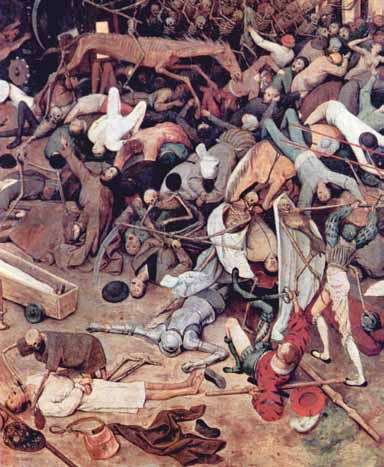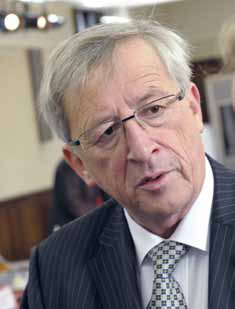Feudalism or Nation-State:
The Choice Is Ours
by Helga Zepp-LaRouche
April 2012
This article appears in the March 30, 2012 issue of Executive Intelligence Review and is reprinted with permission. Helga Zepp-LaRouche
|
March 23—A several-year-long representative survey in Germany has brought to light the fact that the overwhelming majority of Germans, when asked whether political change is possible, said that they do not believe it is. More than 80% of the population in our country is convinced that "there's nothing we can do!" What kind of political system do we live in then, a democracy, an oligarchy, or a feudal dictatorship? And what sort of country do we really want to live in?
We had better get this clear, because we are in grave danger of losing even the last shred of a semblance of democracy. It is now one second before midnight. Because with the signing of the so-called Fiscal Union by the heads of government of the European Union and the imminent adoption of the treaty establishing the European Stability Mechanism (ESM), the situation of the EU and its member states will change dramatically and profoundly.
The Federal Constitutional Court in Karlsruhe, in its so-called Lisbon ruling of June 2009, decided that any further transfer of powers to the EU, which would de facto make Europe into a federal State, would mean a change in the Constitution, and thus would require a referendum, according to Article 146 of the Constitution.
This already applies to the Fiscal Union, which exports the German "debt brake" to all the other European states, establishes an EU budget commissioner who is allowed to intervene into the budgets of the member states; thus we have surrendered a vital achievement of democracy, the right to determine the budget law. The Fiscal Union allows the EU to force each country to impose the same murderous austerity programs that have been already forced upon Greece. Thus, not only democracy, but also the principle of social justice and the right to free collective bargaining are being thrown into the dustbin of history.
Back to the Middle Ages?
This reversal of the achievements of several revolutions and advances in constitutional and international law casts Europe's level of development back to the time before the emergence of the sovereign nation-state in the 15th Century. In effect, the Executive—in this case, a combination of the heads of government and an unelected supranational bureaucracy—is accorded an abundance of power like that of feudal systems at that time. And that was the intention from the outset!
Giuliano Amato, who later became vice president of the so-called European Convention, which drafted the European Constitution, spelled out his intention in an interview with La Stampa on July 12, 2000—i.e., before the introduction of the euro:
That's why I prefer to proceed slowly and break up sovereignty piece by piece, avoiding abrupt shifts of powers from the nations to the Union.... And why should we not return to the time before Hobbes? The Middle Ages had a far richer humanity and a diversity of identity which can be a model. The Middle Ages are beautiful.... Now, as then, nomads are reappearing in our societies. Now, as then there are powers without territories. We will not have totalitarianism without sovereignties. Democracy needs no sovereign.
 EU
Giuliano Amato, who helped draft the European Constitution, explicitly demanded a return to the Middle Ages, before there was such a thing as national sovereignty. “Democracy needs no sovereign,” he said. Right: A detail from Pieter Bruegel the Elder’s “Triumph of Death” shows what life was like in those brutish and nasty times.
|
 |
Just how lovely this new Middle Ages can be, without sovereign nation-states which could defend the common good, is currently being experienced by the Greeks, Italians, Spaniards, and Portuguese, whose life expectancy, because of cuts in social services, is soon likely to be at the level of the Middle Ages.
And remember also what Luxembourg Prime Minister and Finance Minister Jean-Claude Juncker, the former leader of the so-called Eurogroup, revealed in a 1999 interview in Der Spiegel, about what he thinks of democracy, truth, and transparency, and how the "liberal" basic order could be subtly foisted upon the world:
We decide on something, float it, and wait a while to see what happens. If there is no big outcry and no riots, because most people have no idea what has been decided, we continue, step by step, until there is no turning back. (Der Spiegel, 52/1999)
The point at which there is no turning back would be reached with the signing of the ESM permanent bank bailout mechanism. In the face of the constantly deteriorating fiscal position of several EU member states, a drawdown of the full EU guaranteed loan amount would mean a more than 60% loss of budgetary sovereignty for Germany (based on the figure of EU306 billion in federal revenues in 2012). But further increases in the bailout fund are already being demanded, and very soon, a situation could arise in which Germany has to provide more loans and guarantees from its total annual tax revenue.
The ESM Board of Governors, which is comprised of the finance ministers of the Eurozone countries, could, at any time, draw upon on the budgets of the member states, if necessary, to increase the guaranteed sum from the current EU700 billion to any amount required, and it may also request new liquidity directly from the ECB. It may also transfer all powers to the board of directors, the so-called "ESM management." This committee is appointed, not accountable to the voters, has legal immunity, and could, without transparency, run the money-printing presses indefinitely—naturally always in response to the "systemic" nature of the crisis.
Hence, we in Europe and in the United States, where the Fed is pursuing the same policy, are heading straight for hyperinflation like that in Germany in 1923. As we in Germany should know better than anyone else, hyperinflation is the most brutal form of looting of the entire population. And people are noticing this: The EU is already acting like a federal State, barging in on anything and everything, to the detriment of those concerned, but not fulfilling the actual primary task of the State, which is to take responsibility for the general welfare.
Supranational Dictatorship
 Creative Commons
Luxembourg Prime Minister Jean-Claude Juncker, former head of the Eurogroup, described frankly how the EU bureaucracy manipulates the population to accept its decisions, “until there is no turning back.”
|
In so doing, the proponents of the EU dictatorship also do not hesitate to tell the most sophistical lies. Thus, the Frankfurter Allgemeine Zeitungmfall back , on March 22, published a cartoon in which a small dog that has broken loose from his leash faces two large, extremely menacing monsters that are five times as large as he. This is an illustration for an article by Prof. Thomas Danwitz, a judge at the European Court of Justice, titled "Independent—and Then What?" The meaning is that an independent, sovereign Germany would be hopelessly at the mercy of great powers such as Russia, China, or the United States.
The author complains that a "skeptical undertone" has emerged in European political discourse, and that lawyers themselves are complaining about the lack of democratic legitimacy of foreign rule from Brussels. He then goes on to disparage the idea of sovereignty—one of the greatest achievements in European history. Finally, he argues that the substance of constitutional sovereignty was not violated, because the States entered voluntarily into the EU treaty obligations. Therefore, there is no loss of sovereignty, and also because the EU Treaty allows the possibility of withdrawal from the Union.
But who ever asked the citizens whether they wanted to give up the deutschemark, whether they were even were given a chance to read the EU treaties, from Maastricht to Lisbon, let alone whether they wanted them, and whether they want to see their entire life savings squandered by a transfer union and destroyed by hyperinflation?
Don't Be a Slave!
There is a way out of the crisis: We must put a stop to the casino economy and the perpetual honoring of private gambling debts, which are being turned into national debt by the so-called rescue packages, and then the taxpayers have to foot the bill. For this we need a global two-tier banking system and the creation of a credit system, which provides loans to the real economy for investment in productive employment. The sovereign republics of Europe can work together as what de Gaulle called a Europe of the Fatherlands, upholding their interests quite well in cooperation with countries such as Russia, China, or a United States that has returned to the tradition of the American Revolution. But, as I said, as sovereign republics!
With the Fiscal Union and the looming ESM treaty, the limit established by the Constitutional Court's Lisbon ruling in June 2009 has been overstepped. The step toward making the EU a federal State, according to Article 146 of the Constitution, requires a new Constitution, and for this, a referendum is necessary.
Anyone who does not want to lose the last vestiges of democracy, sovereignty, and freedom to a soulless supranational bureaucracy, which is only the executive body of the financial oligarchy, must now fight to ensure that a referendum is held on the Fiscal Union, the ESM treaty, and the question of Germany's sovereignty!
In ancient Rome, a senator had the idea that all slaves should wear a white armband so that they could be more easily identified.
But a wise senator stopped him and said, "No, if they [the slaves] realize how many of them they are, we will soon have an uprising." If the more than 80% of Germans who believe that "there's nothing we can do anyway" began to wear white armbands, we could win the referendum and stop being subservient!
This article appeared as a leaflet, titled "But There's Nothing We Can do! Oh, Yes, There Is!" It was translated from German.
